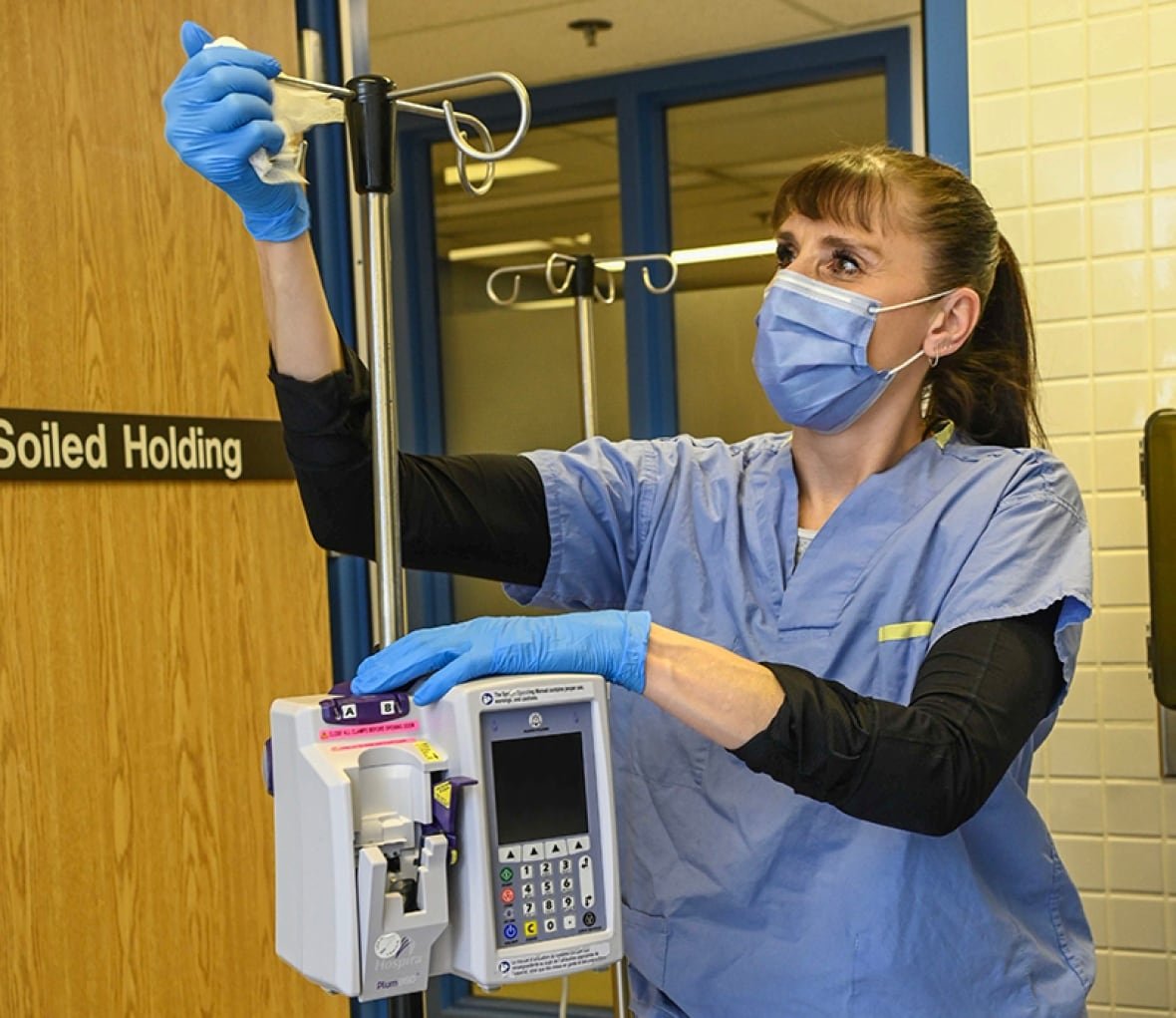The Dose24:30What do I need to know about norovirus?
For Edward Chou, a first-year biochemistry student at the University of Guelph, the symptoms began shortly after lunch on Monday.
“I just felt something in my stomach and I just started throwing up and I had to go to the toilet multiple times,” he said. “It was really bad.”
The University of Guelph is responding to an outbreak of a self-reported stomach illness that has affected more than 170 people. The outbreak is part of a rising trend in stomach bugs causing vomiting and diarrhea.
The Public Health Agency of Canada confirmed in an email that it is seeing higher-than-expected case counts of norovirus. Health officials in the U.S. and U.K. have also reported a rise in norovirus cases.
Testing on Friday confirmed a positive norovirus sample among the University of Guelph’s outbreak of gastroenteritis, according to a Wellington-Dufferin-Guelph Public Health spokesperson.
The school has stepped up its cleaning protocols, especially in washrooms and common areas, said Melinda Scott, vice-provost of student affairs at the University of Guelph.

Dr. Zain Chagla, an infectious disease specialist and associate professor at McMaster University, says seasonal norovirus case counts are on the rise because of winter weather, but also because people are no longer engaged in measures like physical distancing that were encouraged during the COVID-19 pandemic to prevent the spread of viruses.
“We disrupted patterns, they’re now back to normal,” Chagla told The Dose host Dr. Brian Goldman.
Canadian cases of norovirus have risen above the five-year average between 2019 and 2023, according to preliminary data from PHAC’s National Enteric Surveillance program. Increases were noted in multiple provinces including Alberta, Ontario, B.C., Nova Scotia, Saskatchewan and P.E.I.
Chagla also offered another explanation for the higher case counts: physicians could be diagnosing it more often as a result of better testing capacity and a post-COVID emphasis on diagnosis to help control infections.
What is norovirus?
Noroviruses are a highly contagious group of viruses that are responsible for 90 per cent of all epidemic gastroenteritis outbreaks, according to PHAC.
A 2017 modelling review looking at norovirus’s reproductive rate concluded that one person infected with norovirus could infect anywhere between one and seven other people. In comparison, measles — considered one of the most contagious viruses — has an estimated basic reproductive number that ranges between 12 and 18.
While norovirus is present throughout the year, it is dubbed the “winter vomiting bug” because of its prevalence during colder months.
Common symptoms of norovirus infection include nausea, stomach pain and cramps, vomiting and diarrhea. Symptoms typically resolve within 12 to 72 hours.
“This is the sort of thing where people end up basically lying on the floor of the bathroom for 12 to 24 hours sometimes,” said Dr. Lynora Saxinger, an infectious diseases specialist and University of Alberta professor.
Cases of norovirus, a nasty stomach bug that can lay you up for days, are rising again in Canada, hitting pre-pandemic levels. They’re surpassing that mark in the U.K., and also rising in the U.S.
Fever, chills and headaches are other symptoms, she said.
Physicians recommend drinking water to help avoid dehydration that can result from symptoms of norovirus.
“Young children … older individuals, people with kidney disease, that dehydration for a significant amount of time can be compromising to them and may lead them to needing health care in order to deal with it,” said Chagla.
How does norovirus spread?
The virus spreads through the fecal-oral route, when infected fecal particles end up in someone’s mouth. Daycares, preschools and care homes are common sites for outbreaks, and it’s not uncommon for an infected child to transmit norovirus to their parents or guardians.
Chagla said he and his family acquired norovirus after one of his children came home sick from daycare.
“One morning you wake up, and it’s like, ‘It’s my turn now I guess,'” he said.
Norovirus can survive on almost any surface — including door handles, sinks, table tops and glassware — for up to 12 hours on hard surfaces or up to 12 days on contaminated carpets, according to the U.K. National Health Service.
Norovirus infection can also be spread through food and drinks. Health Canada issued a recall for Taylor brand oysters in Ontario, B.C. and Alberta in December due to concerns over possible norovirus contamination.
How to treat norovirus
In most cases, norovirus is treated by letting the infection run its course and staying as hydrated as possible, according to Chagla.
Water and electrolyte drinks like Gatorade and Pedialyte are good options, he said, adding that people with norovirus usually have irritable stomachs that require a slightly modified diet.
The U.S. National Institute of Diabetes and Digestive and Kidney Diseases recommends avoiding drinks with caffeine and high levels of sugar, as well as fried foods and other foods high in fat to avoid aggravating diarrhea symptoms.
Chagla said over-the-counter medications to treat nausea and diarrhea can help get people through the early stages of symptoms, but he urged caution before taking an anti-diarrheal like Imodium. “There’s a physiologic reason to expel stool during the diarrheal phase,” he said.
Wally and Diane King want a refund after they, and hundreds others, became ill days into their trip
For his family, Chagla says he would first ensure there’s no fever, as well as no blood in the stool, before taking Imodium.
Saxinger says prescription anti-nauseants like ondansetron — sold under the brand name Zofran — can also help mitigate and reduce instances of severe vomiting.
Since norovirus is able to linger on surfaces longer than other common winter infectious diseases — like RSV and the flu — experts recommend cleaning high-touch areas regularly to avoid infecting other people in a household.
“When I am looking for a cleaner, I look for a disinfectant product that the manufacturer has claimed to be effective on viruses like norovirus,” said Kerri Cryderman, executive director for environmental services at the Saskatchewan Health Authority (SHA).

Cryderman said the SHA relies on a systematic approach when cleaning facilities.
People at home can use similar strategies to avoid spreading infections, such as by using different cloths for different parts of the home.
Cryderman said staff also make sure to clean high-touch areas — like doorknobs, light switches, handrails and faucets — to minimize the spread of germs.
According to Chagla, norovirus is resistant to alcohol-based hand sanitizers. He encourages people to regularly wash their hands with soap and warm water before, during and after they’ve developed symptoms to better protect against the spread of infection.
Vaccines are in development
There are relatively few treatments for norovirus but Chagla said there are vaccine candidates that have shown some promise.
Moderna, which developed an mRNA-based COVID-19 vaccine, currently has a phase three trial for an mRNA norovirus vaccine. In 2024, Vaxart announced it had completed phase one trials for an oral norovirus vaccine.
“Gastrointestinal viruses are really mitigated by antibodies in our gut, which is a specific response that’s a little bit different than other vaccines that we trigger people with,” said Chagla.
“So hopefully we do see benefits.”



